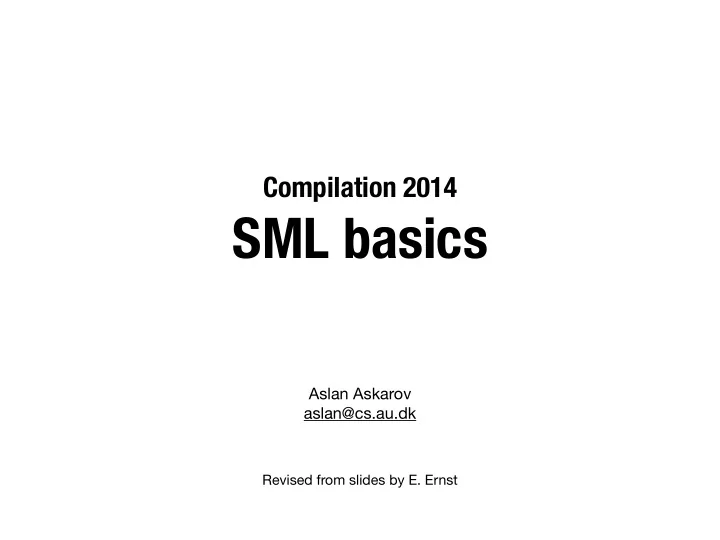

Compilation 2014 SML basics Aslan Askarov aslan@cs.au.dk Revised from slides by E. Ernst
ML • Functional programming language • Development initiated by Robin Milner at Edinburgh in 1970s • First implementation in 1974 on PDP-10 • Evolved over a period of 20+ years • Fusion of many ideas from many people • Initial application: DSL for manipulating logical proofs • ML = Meta Language • Tremendous influence on the design of modern programming languages • Type inference, polymorphism, safety, …
Robin Milner “In 1956 […] I regarded programming as really rather inelegant. You’d write one instruction after the other, and it was all rather arbitrary. It seemed to me that programming was not a very beautiful thing. So I resolved that I would never go near a computer in my life!” � � – R. Milner (interview by M. Bergen, 2003) ACM Turing Award, 1991 “For three distinct and complete achievements: 1) LCF , the mechanization of Scott's Logic of Computable Functions, probably the first theoretically based yet practical tool for machine assisted proof construction; 2) ML, the first language to include polymorphic type inference together with a type-safe exception-handling mechanism; 3) CCS, a general theory of concurrency. In addition, he formulated and strongly advanced full abstraction, the study of the relationship between operational and denotational semantics.” Honorary Doctorate, Aarhus University, 1998
Standard ML • SML is a dialect of ML • Functional language • Functions are first class (like in Scheme) • The core syntactic category is expressions (not statements) • Assignments are possible, but rare • SML is statically and strongly typed • No NullPointerExceptions, no ClassCastExceptions • no casts, but many usages of pattern matching • Since everything is an expression, everything has a type • The interpreter (and the compiler) infers many types automatically • Variables are often declared w/o an explicit type
Using SML • SML comes with a read-eval-print loop (like Python and Scheme) � � > sml Standard ML of New Jersey v110.76 [built: Fri Aug 1 00:28:43 2014] � - print "hello, world!\n"; � hello, world! val it = () : unit � - � • All interactions must end with semicolon
Basic types (1/4) • SML comes with a number of base types • int, char, bool, string, real, … • Integers are 31-bit: ~ 1, 0, 1, 42, Int.maxInt , … all have type int • int/real types come with usual operations: +, -, *, div, /, mod, … • Note that unary negation is tilde, not munis • Check out the associated libraries: open Int; ..Char, Bool, String, Real
Basic types (2/4) SML comes with • Booleans: true and false both have type bool • Boolean negation is not , conjunction is andalso , and disjunction is orelse • Usual comparison operations also produces bool s: = , <>, <, <=, >, >=, … � • Characters: #”a”, #”X”, #”\n”, #”\\”, #”\012” , all have type char • Conversions are done with chr: int -> char and ord : char -> int
Basic types (3/4) SML comes with • Strings: ” ”, ”hello, world!” both have type string • String concatenation is ^: ”d” ^ ”Ovs” • One can inspect and manipulate strings: String.size, String.substring, String.translate • And convert to and from strings: Int.fromString, Int.toString, Bool.fromString, Bool.toString, …
Basic types (4/4) • () has type unit • Notice how print returned unit • unit serves the purpose of void in C and Java • and doubles as the “empty argument (list)”: SMLofNJ.SysInfo.getOSName() • Technically it is not the “empty type” because one value has the type unit , namely () � • (* This is a (* nested *) comment in SML *)
Conditionals Conditionals in SML are expressions and hence have a types � y + (if x < 0 then ~x else x) � Both then and else branch are required, and must have the same type � if x > 0 then ”hello” else () � Error: types of if branches do not agree [tycon mismatch] then branch: string else branch: unit in expression: …
SML by example
Recommend
More recommend